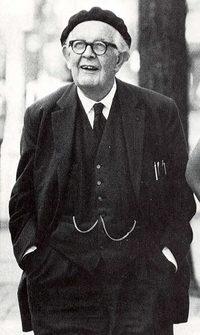Introduction to Psychology 1/IPSY101/Contemporary Psychology/Cognitive and developmental psychology
| “ | It is with children that we have the best chance of studying the development of logical knowledge, mathematical knowledge, physical knowledge, and so forth. | ” |
| —Jean Piaget | ||
Cognitive psychology
As mentioned in the previous section, the cognitive revolution created an impetus for psychologists to focus their attention on better understanding the mind and mental processes that underlie behaviour. Thus, cognitive psychology is the area of psychology that focuses on studying cognitions, or thoughts, and their relationship to our experiences and our actions. Like biological psychology, cognitive psychology is broad in its scope and often involves collaborations among people from a diverse range of disciplinary backgrounds. This has led some to coin the term cognitive science to describe the interdisciplinary nature of this area of research (Miller, 2003[1]).
Cognitive psychologists have research interests that span a spectrum of topics, ranging from attention to problem solving to language to memory. The approaches used in studying these topics are equally diverse. Given such diversity, cognitive psychology is not captured in one chapter of this text per se; rather, various concepts related to cognitive psychology will be covered in relevant portions of the chapters in this text on sensation and perception, thinking and intelligence, and memory.
Developmental psychology
Developmental psychology is the scientific study of development across a lifespan. Developmental psychologists are interested in processes related to physical maturation. However, their focus is not limited to the physical changes associated with aging, as they also focus on changes in cognitive skills, moral reasoning, social behaviour, and other psychological attributes.
Early developmental psychologists focused primarily on changes that occurred through reaching adulthood, providing enormous insight into the differences in physical, cognitive, and social capacities that exist between very young children and adults. For instance, research by Jean Piaget demonstrated that very young children do not demonstrate object permanence. Object permanence refers to the understanding that physical things continue to exist, even if they are hidden from us. If you were to show an adult a toy, and then hide it behind a curtain, the adult knows that the toy still exists. However, very young infants act as if a hidden object no longer exists. The age at which object permanence is achieved is somewhat controversial (Munakata, McClelland, Johnson, and Siegler, 1997[2]).
While Piaget was focused on cognitive changes during infancy and childhood as we move to adulthood, there is an increasing interest in extending research into the changes that occur much later in life. This may be reflective of changing population demographics of developed nations as a whole. As more and more people live longer lives, the number of people of advanced age will continue to increase. Indeed, it is estimated that 15% of the Canadian population was aged 65 years or older in 2013. However, by 2030, this percentage is expected to increase to about 23%. By the year 2063, the number of Canadians aged 80 years and over is expected to reach nearly 5 million (Statistics Canada, 2014[3]).
References
- ↑ Miller, G. A. (2003). The cognitive revolution: A historical perspective. Trends in Cognitive Sciences, 7, 141–144.
- ↑ Munakata, Y., McClelland, J. L., Johnson, M. H., & Siegler, R. S. (1997). Rethinking infant knowledge: Toward an adaptive process account of successes and failures in object permanence tasks. Psychological Review, 104, 689–713.
- ↑ Statistics Canada. (2014). Population Projections for Canada (2013 to 2063), Provinces and Territories (2013 to 2038). Retrieved from http://www.statcan.gc.ca/pub/91-520-x/91-520-x2014001-eng.pdf
- Source
- This page was proudly adapted from Psychology published by OpenStax CNX. Oct 31, 2016 under a Creative Commons Attribution 4.0 license. Download for free at http://cnx.org/contents/4abf04bf-93a0-45c3-9cbc-2cefd46e68cc@5.52.


